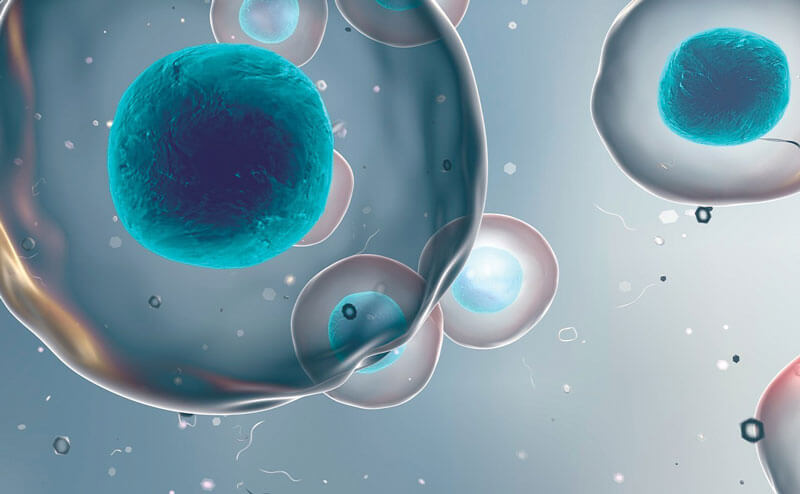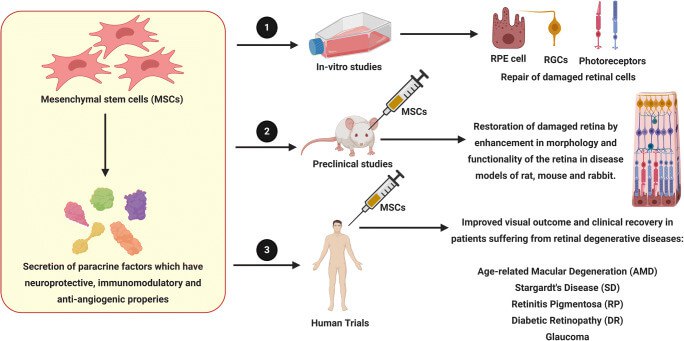Calls for Ukraine
Calls for Europe
Calls for USA

Age-related macular degeneration (or macular degeneration) is a disease that is accompanied by impaired central vision. At the initial stage, it is asymptomatic. However, over time, some people experience a gradual deterioration in vision that can affect one or both eyes. Although AMD does not lead to total blindness, loss of central vision can significantly reduce a patient’s quality of life.
Age-related macular degeneration (AMD) is a chronic disease of the macula. The macula is the area in the center of the retina, the light-sensitive nerve tissue at the back of the eye. According to the WHO, there are more than 170 million people in the world suffering from various forms of macular degeneration. In addition, researchers predict that the number of people suffering from this disease will only increase in the coming years. Therefore, the search for new, more effective methods of treating AMD is an important task of modern medicine, and the use of cell technologies is one of the most promising in this area.
As the name implies, age-related macular degeneration is more common in older people (over 60). Additional risk factors for developing the disease are:
If risk factors are present, lifestyle interventions can help reduce the risk of developing macular degeneration and loss of central vision.

How does a person with age-related macular degeneration see
The course of macular degeneration is divided into three stages: early, intermediate and late. In the first two stages, the disease may be asymptomatic or manifest as blurred vision in one or both eyes. It becomes difficult for a person to read, drive a car.
Other signs and symptoms of AMD are:
People with dry macular degeneration often experience no symptoms. Blurred vision in one or both eyes develops gradually. In patients with wet AMD, loss of visual function occurs abruptly and rapidly.
The most common form of age-related macular degeneration. It is associated with the appearance of small yellowish deposits (waste products of RPE – retinal pigment epithelium). Gradually, they increase in size and prevent the flow of nutrients to the retina. This leads to the death of photosensitive cells and subsequent visual impairment. Dry AMD usually develops slowly.

Drusen of the retina
Gradually, the pigment epithelium and the retina wear out, which leads to their atrophy and loss of central vision.

Atrophy of the retina
This form of the disease is caused by the abnormal growth of new blood vessels, accompanied by leakage of fluid and blood into the pigment epithelium. In some cases, blood vessels grow through the retina. This leads to damage and destruction of photosensitive cells. Vision loss in wet AMD occurs quickly.

Abnormal vascular growth in wet AMD
Macular degeneration can be diagnosed early, before symptoms appear. To do this, the patient must undergo a comprehensive examination, which includes the following diagnostic tests:
Fluorescein angiography is an important method for diagnosing wet AMD because it can detect the presence of damaged blood vessels.
Indocyanine green angiography helps to identify signs of wet AMD that are not seen on a fluorescein angiogram.
There is currently no cure for dry AMD. Patients with a high number of drusen or severe vision loss may benefit from taking a particular combination of nutritional supplements.
Wet AMD is treated with drugs called anti-VEGF drugs. Treatment helps reduce the number of abnormal blood vessels in the retina and reduce their permeability. The medicine is injected directly into the eye with a very thin needle.
Laser surgery can also be used to treat some types of wet AMD. Using a laser, the surgeon removes abnormal blood vessels, reducing the chance of damage to the macula.

While traditional therapies such as surgery and ophthalmic drugs can slow the progression of eye diseases, newer approaches such as cell therapy have the potential to regenerate damaged retinal architecture.
Stem cells have unique biological properties that make them a promising treatment for many degenerative diseases. For example, they can be used to restore dead light-sensitive retinal cells in age-related macular degeneration. Today, this pathology is the main cause of disability and deterioration in the quality of life in elderly patients in developed countries. None of the existing methods of treatment is able to either reverse or stop the process of retinal degeneration that has already begun. Possessing much greater potential than traditional methods of treatment, cell therapy is a very promising direction in this area.
Late-stage AMD is characterized by massive loss of retinal neurons, so the direct use of stem cells to replace damaged neurons is currently being actively explored. A number of studies have shown that stem cells transplanted into a damaged retina can differentiate into photosensitive cells with subsequent integration and restoration of visual function.

Results of studies of MSCs in the treatment of eye diseases
The most common treatment for age-related macular degeneration is mesenchymal stem cells (MSCs). They are obtained from the patient’s own bone marrow, adipose tissue, or blood, multiplied in the laboratory, and injected back into the bloodstream.
MSCs have powerful immunoregulatory properties, reducing the inflammatory response in the affected retina. By producing numerous growth factors and neurotrophic factors, they support the survival and growth of retinal cells. In addition, MSCs protect light-sensitive cells through anti-apoptotic properties and may promote regeneration of the affected retina through their ability to differentiate into various cell types. All these properties point to the potential of MSCs for the treatment of retinal diseases. This view is supported by the recent results of numerous experimental studies.
Contact your MedTour website medical coordinator to learn more about the new treatment option for age-related macular degeneration.
MedTour company cooperates with the best ophthalmological clinics around the world. Today we offer a unique opportunity to treat age-related macular degeneration using cellular technologies. Call by phone or fill out the feedback form. In the near future, the coordinating doctor of MedTour will contact you and consult for free on all questions that have arisen. He will also select an AMD clinic that best suits your individual needs.
MedTour company cooperates with the best doctors working in the innovative field of cell therapy. One of them is Andriy Kovalchuk, surgeon, candidate of medical sciences. In his interview Dr. Kovalchuk talks about the development of regenerative medicine and the treatment of various diseases with stem cells.
How does a person with macular degeneration see?
With AMD, a person may experience:
In more severe cases of AMD, they completely lose their central vision, which significantly reduces their quality of life.
Can macular degeneration be cured?
Traditional methods cannot restore dead retinal cells. They are aimed only at preventing the progression of the disease. However, today new methods are being actively developed that give a chance for recovery. The most promising of them is cell therapy. Contact a MedTour medical coordinator for a free consultation on a new method of treating AMD.
How to stop the development of macular degeneration?
Traditional techniques cannot stop the development of macular degeneration. But there are innovative approaches that can help you succeed. The most promising of these is cell therapy. Stem cells are able to transform into retinal cells, repairing damage. Learn more from the medical coordinator of MedTour. For a free consultation, call or fill out the feedback form.
Is it possible to go blind with macular degeneration?
With age-related macular degeneration, various complications are possible, such as macular edema, hemorrhages and retinal tears, which can significantly impair vision and even lead to blindness. However, AMD by itself does not cause complete loss of vision, but can seriously affect a person’s quality of life.
Please rate the work of MedTour
